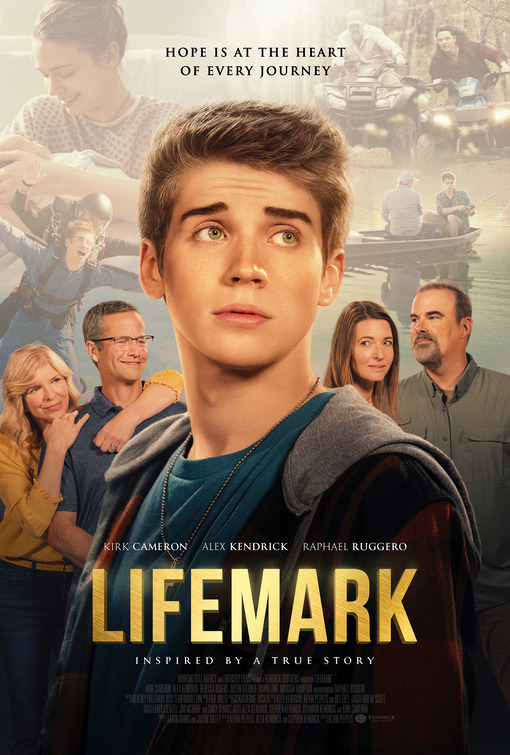Lifemark
Lifemark is a very good movie about adoption. I say that not just as a critic, but as a two-time adoptive parent. There are not as many worthy films on the subject as you would think. Two common plot devices send bad messages. Some of them, like Problem Child, suggest adopted children can be “defective.” Others, including Losing Isaiah, are about birthmothers who attempt to reclaim kids after they've been adopted. The bad message of the first kind is obvious. The bad message of the second is that it makes birthmothers seem unstable or uncommitted to the process. In reality, the vast majority of these women understand the process, choose it in an act of selfless love, and find acceptance of their choice. Lifemark grasps that, demonstrating admirable respect for birthmoms.
David (Raphael Ruggero) is a teenage boy who feels embarrassed about being adopted, despite loving his adoptive parents Jimmy (Kirk Cameron) and Susan (Rebecca Rogers). A serious illness and subsequent surgery get him thinking more about family. Then he turns 18 and receives a letter from his biological mother, Melissa (Dawn Long). She wants to meet now that he's of age. David considers the request, eventually deciding to follow through. He also wants to meet his biological father, Brian (Lowery Brown). Learning their stories, David figures, will help him put his life into context. The film proceeds to show what happens when the family makes the trek to let this meeting happen.
One of the most touching aspects of Lifemark is that it indicates a connection between David and Melissa, even though they haven't seen each other since he was a baby. Scenes where she talks to her husband Shawn (Alex Kendrick) reveal that she's thought about him every day for the past 18 years. Others depict David perhaps initially having a little apathy, yet clearly recognizing that he's been gifted with a loving family as a result of her decision to make an adoption plan. I'm hard-pressed to think of another movie that's come at the topic from that angle. The #1 myth about adoption is that biological mothers don't love or want their babies. That isn't true, which the film makes abundantly clear. When David and Melissa finally do meet, it's almost as emotional for the viewer as it is for the characters.
Generally good acting helps convey the story's theme. Ruggero is winning as David, investing him with a sense of compassion to match his curiosity about why he was placed. Long is also a standout, doing strong work that allows the audience to understand the intense love she has for David. Particularly during the sequences when they meet, the actress brings the joy Melissa feels fully alive. (Good luck not tearing up when you watch this section.) Marisa Lynae Hampton portrays the character in flashbacks that show the events leading to the adoption plan, and she's very good, as well. The weak link is Kirk Cameron, whose performance is limited to smirks and vacant stares. Fortunately, the others are strong enough to carry him.
Lifemark was directed by Kevin Peeples, and co-written/produced by Alex and Stephen Kendrick, the faith-based filmmakers behind War Room, Overcomer, and Show Me the Father. The Kendricks have avoided political content in their work. That's mostly true here, although the movie does have a crucial scene set in an abortion clinic. They're unable to resist the temptation to portray workers there as cold, uncaring people, rather than as compassionate medical professionals attempting to help women. I get the film's creative team is following a personal moral view, but the refusal to consider nuance makes that sequence needlessly heavy-handed.
In line with Lifemark's moral POV is a theme about how choosing adoption allows a human being to experience the joys of life, family, and love. Suggesting an adopted child might be grateful to have been given that opportunity makes sense, and the manner in which David expresses thankfulness is touching. Similarly, most adoptive parents, at some point, realize they have children because a woman chose not to have an abortion. They realize what would be lost if she had chosen that route. It doesn't necessarily mean they're anti-choice; it's just a simple realization that, under other circumstances, this child who means the world to them would not exist.
Message-wise, Lifemark is far more overtly pro-adoption than it is pro-life, even though a tiny bit of that admittedly runs underneath. And there are shades to the “don't abort your baby because a couple would love to adopt it” idea that the movie has neither the time nor the inclination to get into. (The majority of white couples, for instance, are only interested in adopting white babies.) That said, on its chosen level, the film proves to be an entertaining, deeply moving celebration of adoption, and of the idea that an adopted child is lucky because they have a lot of people in their life who love them.
Note: To read more about adoption-related movies, check out my book Straight-Up Blatant, which has an entire section devoted to the topic. It's available in paperback and Kindle versions at Amazon.
out of four
Lifemark is rated PG-13 for some thematic material. The running time is 1 hour and 45 minutes.
